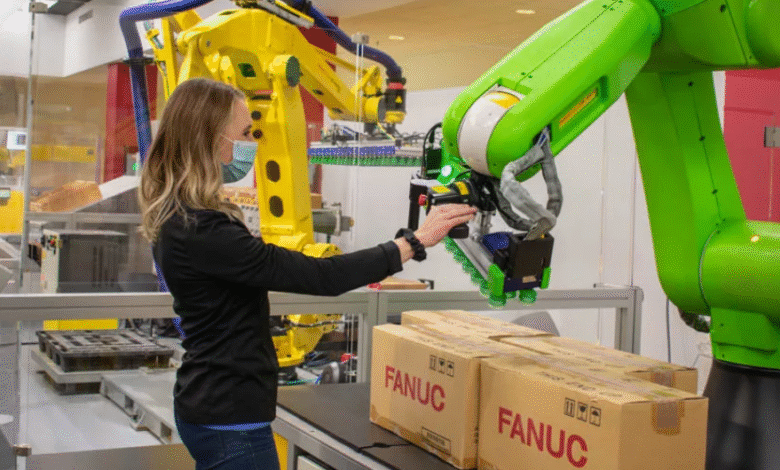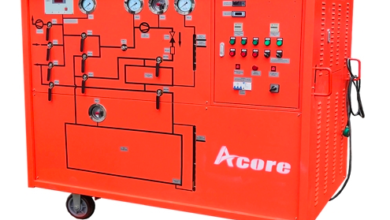What is Cobot Robot and How it Innovates Manufacturing

A cobot robot is a collaborative robot designed to work alongside humans, making manufacturing processes more efficient, flexible, and safe. Unlike traditional industrial robots that operate in isolation, cobots are built with advanced sensors and safety features that allow seamless interaction with workers on the production floor.
From performing repetitive tasks to assisting with precision-heavy operations, cobot robots are driving innovation in modern manufacturing. In this article, we’ll explain what a cobot robot is and how it continues to transform the future of industrial production.
What Is a Cobot (Robot)?
A cobot, or collaborative robot, is designed to work safely alongside humans in the same workspace. Unlike traditional industrial robots, which often require safety cages or separate areas, cobots use advanced sensors, force limits, and AI technology to detect and respond to human presence in real time.
This human-centered design allows cobots to handle repetitive, tiring, or physically demanding tasks, freeing employees to focus on more creative, strategic, or value-added work. Rather than replacing humans, cobots collaborate with them, enhancing efficiency, safety, and productivity in industries such as manufacturing, assembly, inspection, logistics, and more.
Collaborative Robots (Cobots) and Their Key Features
Collaborative robots, or cobots, are designed to work safely alongside humans, boosting productivity without compromising safety. Here are the main features that make them effective:
Safe Human Interaction
Cobots are built to operate in the same workspace as humans. They have safety features like force sensors, cameras, and AI motion control, which help them detect and respond to people nearby. This allows them to work safely without fences or barriers.
Advanced Sensors and Safety Systems
Force and Torque Sensors: Detect contact with humans or objects and stop or adjust movements to prevent accidents.
Vision Systems: Cameras and software help cobots recognize objects and position themselves accurately.
AI Motion Control: Artificial intelligence allows cobots to adjust their movements in real-time, improving safety and efficiency.
Flexibility and Easy Programming
User-Friendly Interfaces: Intuitive touchscreens or visual programming tools make cobots easy to program without specialized skills.
Adaptability: Cobots can be quickly reprogrammed or moved to handle different tasks, making them ideal for changing production needs.
Repetitive and Precision Tasks
Repetitive Tasks: Cobots can perform the same task continuously without getting tired, ensuring consistent quality.
Precision Tasks: Advanced sensors and controls let cobots handle tasks that require high accuracy, such as assembly or quality inspection.
Cobots combine safety, flexibility, ease of use, and precision, making them valuable partners for humans in a wide range of industrial applications.
See also: Understanding the Hydrogen generator manufacturers: An Overview innovative technology
How Cobots Innovate Manufacturing
Cobots are changing manufacturing by improving efficiency, safety, quality, and flexibility. Here’s how they make a difference:
Boosting Efficiency and Productivity
Cobots automate repetitive and labor-intensive tasks, reducing cycle times and increasing output. They perform tasks faster and more consistently than humans, allowing workers to focus on more complex activities.
Enhancing Safety
Cobots are designed to work safely alongside humans. Advanced sensors and safety systems help them detect and respond to people nearby, reducing the risk of injuries and allowing shared workspaces without cages.
Reducing Errors and Improving Quality
Cobots deliver consistent, high-quality results by performing precise tasks that are challenging or tiring for humans. This reduces mistakes, waste, and rework, while boosting customer satisfaction.
Enabling Flexible and Adaptive Production
Cobots can be quickly reprogrammed to handle different tasks, making them ideal for environments with changing production needs. They support high-mix, low-volume manufacturing and adapt to shifting demands.
Supporting Small-Batch and Customized Production
Cobots are easy to program and reconfigure, making them perfect for small-batch or customized production. They can switch between products quickly, reducing downtime and helping manufacturers respond to market needs.
Cobots improve efficiency, safety, quality, and flexibility in manufacturing. They enable adaptable and agile production, making operations more productive, resilient, and responsive to changing demands.
Applications of Cobots in Industry
Cobots are versatile robots used across many industries due to their adaptability, precision, and ability to work safely alongside humans. Key applications include:
Machine Tending and Assembly
Cobots load and unload materials in CNC machines, presses, or injection molding machines, improving productivity and reducing risk in dangerous areas. They also perform precise assembly tasks, such as assembling electronic components, automotive parts, or delicate medical devices, ensuring consistent quality.
Quality Inspection and Material Handling
Cobots enhance quality control by using vision systems to detect defects, measure tolerances, and ensure products meet strict standards. In logistics and warehousing, they efficiently handle tasks such as palletizing, depalletizing, packaging, and sorting, reducing worker strain, streamlining operations, and increasing overall productivity.
Welding and Soldering
Cobots perform precise welding and soldering tasks, maintaining consistent quality while reducing human fatigue and exposure to hazardous fumes. They are particularly useful in automotive, aerospace, and heavy equipment manufacturing.
Painting and Coating
Cobots can apply paint or coatings evenly on surfaces, improving finish quality and reducing overspray or material waste. This is valuable in automotive and consumer goods production.
Packaging and Palletizing
Cobots efficiently pick, pack, and stack products on pallets. Their flexibility lets them handle different sizes and shapes, speeding up production and reducing the need for manual labor.
Cobots are flexible robots that improve efficiency, safety, and quality in various industrial tasks.
Benefits for Manufacturers
Integrating collaborative robots (cobots) into manufacturing brings major benefits, helping factories work faster, smarter, and more safely.
Increased Output and Lower Labor Costs
Cobots can work continuously, handling repetitive tasks with precision. This boosts production while reducing overtime and labor expenses. Studies show that robotics can cut operational costs by up to 30%, minimize errors, and improve product quality.
Faster Adaptation to Production Changes
Cobots are flexible and can be quickly reprogrammed for different tasks, allowing manufacturers to respond rapidly to changing market demands or production schedules. AI-powered robotics further reduces operational costs and helps address labor shortages.
Improved Workforce Collaboration
Designed to work safely alongside humans, cobots enhance workers’ capabilities rather than replace them. They handle dangerous or physically demanding tasks, improving safety and efficiency while freeing humans for more strategic work.
Long-Term Cost Savings
Cobots deliver long-term value by minimizing waste, lowering labor costs, and boosting efficiency, making them a smart and cost-effective investment for sustained productivity and competitiveness.
Cobots boost productivity, reduce labor costs, enhance safety, adapt to new tasks, and provide long-term savings, making them a smart investment for manufacturing.
The Future of Manufacturing with Collaborative Robots (Cobots)
Cobots are transforming manufacturing by making operations more efficient, safe, and flexible, with key trends shaping their future. Key trends shaping their future include:
Rapid Market Growth:
The global cobot market is experiencing rapid growth due to labor shortages, digitalization, and increasing demand for flexible automation.
SME Adoption:
Cobots are increasingly affordable and easy to deploy, enabling small and medium-sized manufacturers to boost productivity and competitiveness.
Advanced Technologies:
AI, machine learning, and IoT integration allow cobots to learn from their environment, optimize tasks, and predict maintenance needs.
Smart Factory Integration:
Cobots safely collaborate with humans, can be quickly reprogrammed for different tasks, and communicate with other smart devices to support flexible, data-driven production.
Cobots are revolutionizing manufacturing by enhancing efficiency, safety, and flexibility. Their integration into smart factories and alignment with Industry 4.0 principles are driving a new era of adaptive, innovative, and competitive industrial operations.



